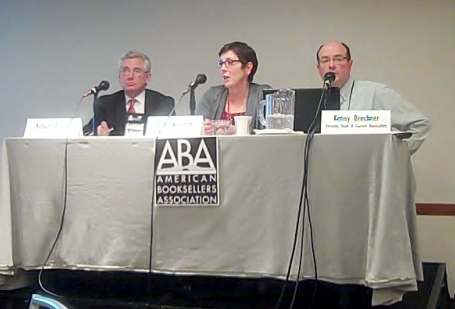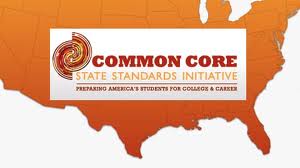Wi8 Panelists See Immense Opportunity in Common Core Standards
 |
|
Wi8 panelists Richard Buthod, Becky Anderson, and Kenny Brechner |
During a popular Saturday Winter Institute breakout session entitled “Nonfiction Buying With Core Curriculum in Mind,” panelists Becky Anderson of Anderson’s Bookshops in Naperville, Illinois; Kenny Brechner of Devaney Doak & Garrett Booksellers in Farmington, Maine; and Richard Buthod of Turtleback Books in St. Louis, Missouri, explored how the new Common Core State Standards, which call for students to read more complex, informational texts, are impacting their schools, communities, and nonfiction sales.
“I think there’s a big learning curve for all of us,” Anderson stated in her welcome. “It’s not just for us as booksellers but for educators as a whole.”
And she quipped, “There’s nothing ‘common’ about Common Core.”
While there may be a steep learning curve, the panelists agreed that there is also an immense opportunity. As educators and librarians scramble to seek out appropriate texts to use in their teaching, booksellers can serve as valuable resources. “We are the place of discovery,” Anderson said. “We can help solve problems. We can become — as we already are — those ‘local experts.’”
 The Common Core State Standards are expected to reach full implementation in all states by August 2014.
The Common Core State Standards are expected to reach full implementation in all states by August 2014.
Buthod, who has concentrated his studies on Common Core for years, stated that “without a doubt, this will require much, much more reading. The volume of reading and writing that will be asked of students is about to go through the roof.” And the schools? Buthod thinks that they “are not prepared for it.”
One major change brought about by Common Core is the enhancement of the levels of expectation for student achievement, especially regarding Lexile levels. “What once was common for second grade will become common for first grade,” Buthod warned.
Booksellers can look to three yearly awards that are given to nonfiction titles each year for guidance: the YALSA Award for Excellence in Nonfiction, the NCTE Orbis Pictus Award for Outstanding Nonfiction for Children, and the Robert F. Sibert Informational Book Medal. Booksellers can also make use of Appendix B of the Common Core State Standards to get ideas about what types of well-known texts meet the new guidelines.
“Be aware of these [exemplars], and use them as a starting point,” Buthod said. “Where a store can give immense help to a teacher is taking these examples and going up and down the ladder … If you see Little Bear in first grade, what would you give the child that likes Little Bear in second grade? … You’re the title experts. There’s nobody that knows the titles like you do. [Educators] are experts at teaching reading; let them teach reading. When it comes time to building lists and knowing about books … come to the bookstore.”
“Part of what we need to do in terms of our outreach is to help [school librarians]. They’re looking to us for guidance,” said Brechner. A big change that will come about during implementation is a decrease in the use of textbooks that fail to meet the standards for complexity. “This is fantastic news for a number of reasons,” Brechner stated. “As booksellers, this is a major move from the educational market … away from textbooks and into our world — into the world of trade books.
“It’s important for us to understand that we can trust our sense of complexity in this environment.” When booksellers identify nonfiction texts that they know are complex, valuable resources, they should not hesitate to make recommendations to teachers and librarians, he added.
“We do a mock Sibert Award in our store,” said Anderson, “just like a mock Newbery…. We get about 500 students, and we put the list together at the beginning of the school year … and we do book talks at the schools. The requirement is that for a book talk, you have to buy at least one complete set of the 25 books on the list. Many schools buy multiple sets.”
Brechner then showed a short video featuring Clarissa Thompson, Common Core State Standards expert and Associate Professor of Secondary English Education at the University of Maine at Farmington, who responded to the question, “If you had three minutes to tell booksellers what they really needed to know, what would you say?”
Thompson explained that the new standards have three main goals:
- Students will read more and read complex texts.
- Students will need to read more informational texts (essays, biographies, memoirs, journalism, etc.).
- All teachers of all subjects will be invested.
“Every teacher is a reading and writing teacher now,” remarked Buthod.
One way that Brechner actively reaches out to teachers is via his e-newsletter, the Educator’s Forum. He is also curating a list of Common Core appropriate titles, organized by grade and subject, on his website. Brechner includes yet-to-be-released titles in online “pick lists.”
“When you’re doing a front list buy and you run into a great nonfiction title, that’s the moment,” he explained. “All I have to do is open up my pick list, pop that ISBN into the right field, and then move on. You’re enriching your list as you go. It’s a natural process to grow your list.”
Anderson puts together STEM (science, technology, engineering, and math) title lists for teachers and holds book fairs just for STEM books that address the new standards. “We’ve created so many lists for different grants,” Anderson added. “There is grant money out there for STEM.”
Although educators are natural partners in Common Core, Anderson stressed that the standards open the possibility for stronger bookseller-parent relationships as well. “All parents want their kids to succeed with the new standards,” Anderson said. To foster this connection, she creates in-store displays and hosts events that focus on informational books that both parents and their children will enjoy.
The Common Core State Standards present bookstores and trade publishers with an opportunity to work together to enrich the learning environments in their communities and sell more books. “What happens if Common Core works?” speculated Buthod. “Libraries burst with readers. Bookstores thrive. And students soar in ways that we cannot imagine.”